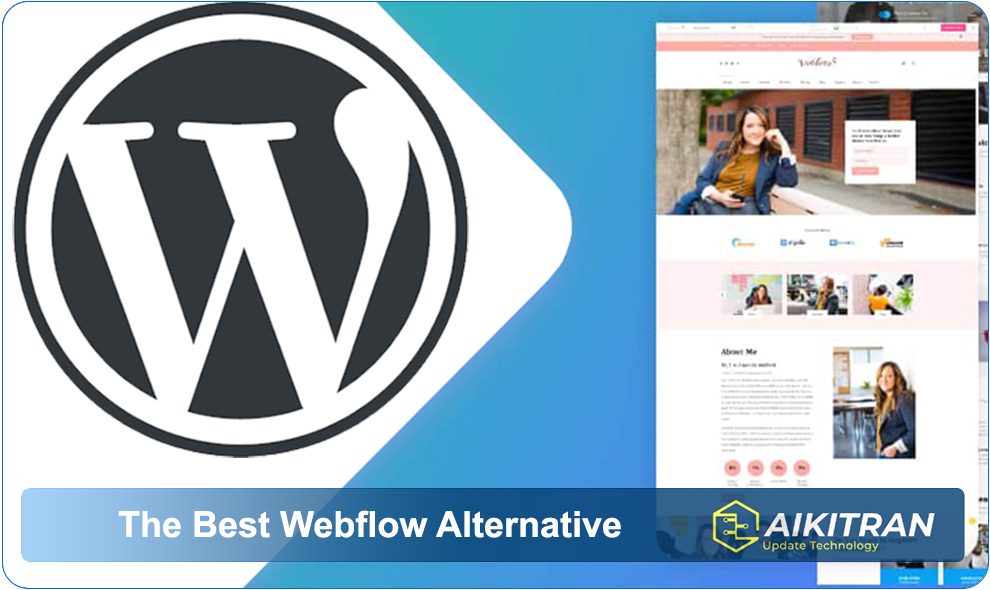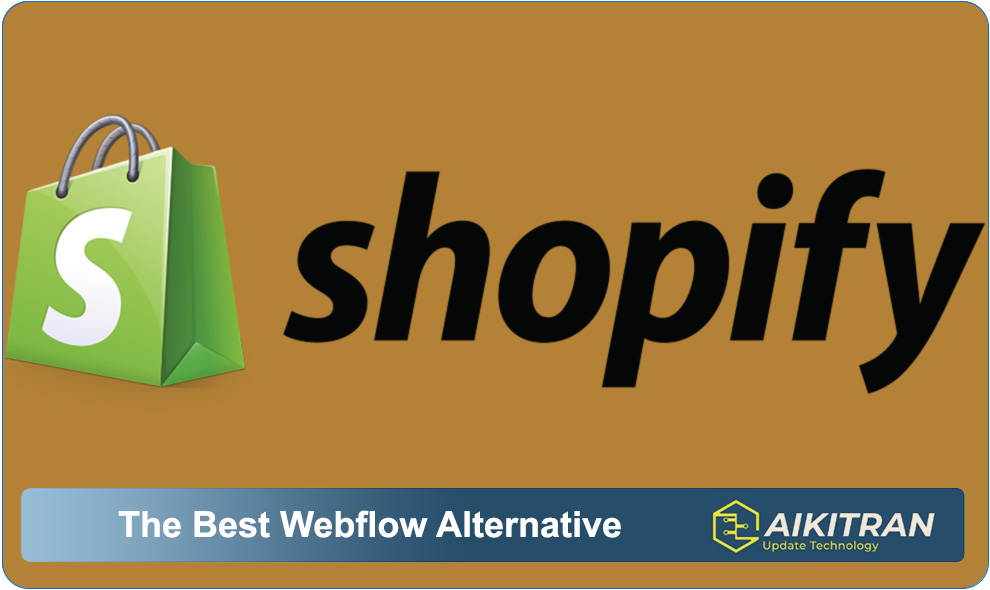Choosing the Best Webflow Alternative for Your Business
The Best Webflow Alternative: Selecting the ideal Webflow alternative for your business depends on what it needs from it. Most platforms provide trials or demo versions so that you can test out their software prior to making a purchasing decision.
Framer is an effective Webflow alternative that brings designs to life through interaction and animations, making responsive web apps and mobile apps possible.

WordPress
Webflow is an exceptional website builder for designers looking to quickly design stunning sites without writing code, yet this platform may not meet all users’ needs. Webflow requires some tech knowledge for use and its steep learning curve may make it unsuitable for beginners entering web design.
Website builders offer an abundance of features that can assist in creating the website of your dreams. With its CMS capabilities and immersive user experiences capabilities, website builders are an ideal solution for content-driven websites.
One of the greatest advantages of WordPress is that it is free, open source software with an extensive library of plugins and extensions available for it. Furthermore, WordPress includes various SEO features to help optimize your website for search engines.
WordPress stands out as an invaluable platform due to its intuitive user-interface and abundant themes, making editing and customizing an effortless experience. Furthermore, this platform supports all major browsers and mobile devices for seamless operation.
Selecting a suitable website builder for your business is key to its success, as a poorly constructed website can compromise brand image and lower sales. This guide will assist in selecting an ideal website builder, from free services that rival paid platforms to building mobile-friendly sites that keep customers returning – take a read to see where your business can take off!
You must read… HOW TO IMPLEMENT CONVERSATIONAL AI IN YOUR BUSINESS 2024

Shopify
Webflow’s competitors and alternatives for creating websites include Wix, WordPress and Weebly as possible alternatives and competitors. While they all provide similar services, their user interfaces and features differ in regards to user friendliness as well as price. There may even be free plans available as some may allow for expanded functionality of your site’s capabilities compared to paid plans available through paid plans – when selecting software solutions make sure it fits with the specific requirements and goals of your business – Wix WordPress Weebly are some popular alternatives that exist alongside Webflow among many others! Among its alternatives and competitors include Wix WordPress Weebly;
Weebly’s website builder is user-friendly, offering templates to get you going quickly. Additionally, there is a drag-and-drop editor and built-in themes to create professional-looking sites quickly. However, Weebly does not provide as much customization or flexibility compared to Webflow, nor mobile friendly features which are essential features for modern sites.
Framer provides another great alternative to Webflow for designers to quickly build interactive prototypes and animations, enabling them to visualize their designs while engaging their target audiences and increasing conversion rates. Furthermore, Framer helps reduce cart abandonment by enabling customers to save items for later.
Shopify provides an accessible eCommerce platform with a robust set of eCommerce features and an intuitive user interface, making managing inventory and sales straightforward. Furthermore, its advanced security system ensures customers’ personal and financial information remains protected at all times. Furthermore, Shopify provides numerous add-ons and integrations that further expand its capabilities.
Squarespace, another website builder with easy-to-use website building features, offers managed hosting and eCommerce capabilities. Though Squarespace doesn’t come equipped with an intuitive code editor, its templates offer plenty of design choices while it can integrate with various platforms to enable eCommerce capabilities.
Wix
Building a website was once an intricate task that required extensive knowledge of HTML, CSS and JavaScript coding languages. But no-code website builders have simplified web creation for non-tech digital visionaries like Webflow users – although Webflow still requires technical literacy from users.
Wix is a popular alternative to Webflow, offering an easy drag-and-drop interface and numerous templates and features, including SEO tools and customer support. Wix’s intuitive editing tool enables anyone without prior design experience to create professional-looking websites quickly. Artificial Design Intelligence also gives users control over choosing a style and layout for their site.
This software is ideal for small businesses who regularly update content. The user-friendly editor lets you add and modify text, images, links, and other elements on your site easily and seamlessly. Plus it includes SEO tools like meta and canonical tags to make sure that search engines can index it effectively.
Advanced eCommerce features of Shopify allow you to manage inventory, sell in multiple currencies and provide customers with an effortless online shopping experience. Furthermore, cart abandonment reduction helps increase sales as a major hurdle is eliminated – while no transaction fees are charged unlike many other eCommerce platforms.
Email marketing tools from Drip enable you to easily craft automated emails that nurture leads, build relationships, and drive conversions. Customize templates as needed or even add videos for an extra personal touch – plus track email campaign performance analytics!
Canva
Selecting an ideal website builder for your business can be challenging. There are various aspects to take into account, including functionality, pricing and support – the ideal website builder will strike a balance between these factors, providing all of the features that will enable your success at an acceptable price point so as to meet profit goals.
If you want to sell products online through your website, there are various eCommerce platforms you can select from; Square and BigCommerce offer robust feature sets but have different focuses; for instance Square may be more suitable for restaurants as it includes special features like table management, tipping, and loyalty card functionality; on the other hand BigCommerce might provide better advanced sales tools and analytics.
An alternative option would be to utilize a platform that offers both website building tools and content management systems, making the creation and management of your site much simpler without needing to learn coding. Furthermore, many of these platforms also include features essential for running a successful business such as analytics and search engine optimization.
Canva offers an easy and cost-effective solution for beginners looking for their first website: its page builder can be used to easily create portfolio and resume sites, among others. Plus, its easy interface makes the experience seamless!
ClickUp is a web development project management tool that is an alternative to Webflow, offering the capability of setting measurable goals and tracking team progress with visual roadmaps and checklists for easy management of workflow. Furthermore, its integration with Git can simplify release management.
BigCommerce
BigCommerce is one of the premier Webflow alternatives for eCommerce websites, offering a host of templates and features to make creating an effective site easy. Its user-friendly interface also makes creating pages straightforward; while tracking customers’ carts reduces cart abandonment rates. All these aspects combined help increase sales while simultaneously improving conversion rates.
This platform is highly configurable and supports various languages such as Ruby on Rails, Python, JavaScript and CSS. Furthermore, it comes equipped with its own Content Management System (CMS) as well as integrations. Furthermore, email support and developer community are both provided. Lastly, no transaction fees are applied – making a real difference to small businesses!
However, Webflow’s steep learning curve precludes it being used by beginners without an established technical understanding of HTML, CSS and JavaScript. Furthermore, to use efficiently it requires having knowledge in front-end development as well.
Framer is an appealing Webflow alternative, enabling designers to craft interactive prototypes and stunning animations without needing a code platform. It features drag-and-drop functionality as well as customizable layouts. Furthermore, Framer helps users develop responsive mobile experiences faster by shortening development time.
ClickUp is an impressive project roadmap creator and management platform, providing goal-oriented workflow to keep the most important tasks on track and increase team productivity. Measurable milestones can be set with visual roadmaps showing progress, dependencies and blockers; ClickUp also supports Git-based software development cycles with customizable release trains and go-live checklists as well as detailed bug reporting with visual status updates – making ClickUp one powerful solution.
1 thought on “The Best Webflow Alternative for Your Business 2024”